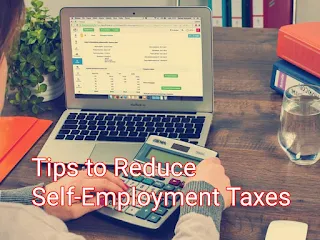Tips to Reduce Self-Employment Taxes
Whether running your own business, working as a freelancer, or a contractor, you fall under self-employed people. As such, you owe the government self-employment (SE) taxes. You must contribute to Medicare and Social Security funds at 15.3% of your total earnings.
Self-employment tax does not only apply to people who run their own businesses. If you’re employed and still have a side gig, you must also pay SE taxes. As long as the income exceeds $400 and is not passive such as rental income, you must pay SE taxes.
Self-employment taxes can add up a lot, sometimes exceeding the income tax. Remember, you must pay 7.65% as the employee and 7.65% as the employer.
Employees pay SE taxes through employer withholding, while employers must remit additional tax contributions on behalf of their employees.
So, how do you reduce the self-employment taxes? This article gives you some tips.
Save Through S Corp
One of the ways to reduce your self-employment taxes is to change your business model. If you’re running your business as a sole proprietor, you’re required to file Schedule C reporting income and personal federal income tax returns.
All your income as a sole proprietor is subjected to SE taxes because the owner and the business are considered the same entity. The same applies to a partnership where your share of income is still subjected to SE tax.
However, if you’re running a corporation or a limited liability company, you’ll have several opportunities to reduce your self-employment tax liability.
C corps, S corps, and LLCs are treated as separate entities from the owner. These entities will pay taxes at corporate rates and are not subject to SE taxes.
So, if you’re running any of these entities, you’ll make an S Corp election with the IRS, which allows you to pay yourself a reasonable salary out of your earning. The money you pay yourself will be subject to income tax, not self-employment income.
Apart from taking a reasonable salary, you can also distribute any additional earnings as dividends, which are not subject to SE taxes.
Increase Your Business Expenses
Self-employment taxes are usually deducted from your net income per year. The more the income, the more taxes you’ll need to pay. If you increase your business expenses, your net income will reduce, which means lowered taxes.
Some business expenses that can help with your tax deductions include employee wages, legal fees, insurance, rent and utilities on the business premises, office expenses, and advertising fees.
These expenses must be ordinary and necessary for the operations of your business for them to qualify for tax deductions.
For example, if you deduct home office expenses, make sure you operate your business partly from your home. A portion of your home must be used as a business office or a workshop.
Make Contributions to Your Retirement Accounts
Apart from taking the allowable business deductibles, you can also reduce your income tax by contributing to your retirement accounts. Contributing to your retirement accounts lowers your income tax and reduces self-employment income taxes.
Retirement accounts are traditional IRAs, SEP-IRAs, and 401(k) plans.
Traditional IRAs can be a simple retirement account for business owners. This account allows you and your employees to contribute towards your retirement. These contributions are not subject to taxes.
SEP-IRA allows self-employed individuals to contribute 25% of their earnings up to a maximum of $66,000 to their retirement accounts. These contributions are tax deductibles and can significantly reduce your SE taxes.
Finally, 401(k) plans are solo contributions to your retirement account of up to $66,000 or 100% of your self-employment net earnings, whichever figure is less. Like the other two retirement accounts, 401(k) plans are also tax-deductible and can significantly reduce your taxable income.
Seek Professional Help
Tax issues are complicated, and it is advisable to work with a professional to avoid getting into trouble with the law. If you feel that the amount you’re paying in SE taxes is too much, even after using some tips to reduce them, you need the services of a tax professional.
The experts in tax services or financial advisors can help you identify opportunities to reduce self-employment taxes and still comply with the tax laws. They can help you develop and evaluate various tax strategies that work for your situation.
For example, a tax expert can help you identify opportunities to reduce taxes, such as taking home office deductions if you use your home as your office. Another way is through taking health insurance premiums as a business expense.
Remember, these experts are conversant with the latest IRS rules and regulations and are always compliant with the tax laws. They can help you stay compliant and not make any mistakes that can get you in trouble.
Final Thoughts
There are many legal ways to reduce your self-employment taxes. However, you must be careful because tax laws keep changing, and what worked in the previous years might not work anymore. You need to do your research and plan carefully before taking any measures.
Also, remember lowering your SE taxes comes with its advantages and disadvantages. For example, you will lower your tax liability and keep more of your earnings if you reduce your SE taxes.
However, you’ll lower your social security contributions and reduce the amount you’ll be eligible for in the future.
So, as much as you’re preventing these taxes from taking a huge chunk of your earnings, you need to plan carefully. Ensure the benefits you get will outshine the drawbacks. Working with a professional can help you make a more informed decision.











